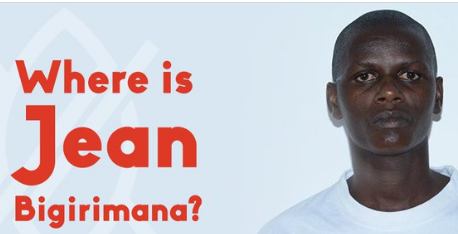Photos: Iwacu\Twitter
Five years ago, Abbas Mbazumutima led a team of journalists from the independent Burundian news outlet Iwacu in investigating a story no reporter should ever have to write — about the July 22, 2016 disappearance of their colleague, reporter Jean Bigirimana, who went missing shortly after receiving a call from an intelligence source.
The Iwacu journalists traced their colleague’s steps to Bugarama, a town in the central Muramvya province, where sources said that Bigirimana was last seen in the company of people thought to be intelligence personnel, Mbazumutima, Iwacu’s chief editor, told CPJ via email. In a remote river they found two decomposing bodies, one of which they feared was Bigirimana, he said. But authorities buried those bodies before they could be conclusively identified, leaving basic questions unanswered, Iwacu reported at the time.
Today, half a decade later, Bigirimana’s disappearance remains unsolved. Mbazumutima told CPJ he believes the journalist is dead while Bigirimana’s family continues to ask for DNA identification of the bodies, according to Iwacu.
Bigirimana worked at Iwacu for just a few weeks before he went missing, said Mbazumutima, who believes that an incident involving the journalist’s previous employer, Rema FM, may have been a factor in his disappearance. Rema FM is a ruling party-affiliated radio station that was temporary closed following a 2015 attack amid civil unrest that erupted when Burundi’s president sought a third term, precipitating an attempted coup, as CPJ documented at the time.
Mbazumutima told CPJ that Bigirimana had confided in him that he feared for his safety after individuals the journalist believed to be affiliated with the ruling party’s youth wing, the Imbonerakure, had accused him of conspiring to attack Rema FM.
According to Mbazumutima, the journalist’s accusers said that Bigirimana was implicated in the attack because he was related to a former official, Léonidas Hatungimana, who was later sentenced to life in prison in absentia for his alleged role in the coup attempt, according to the BBC and a court document reviewed by CPJ. Reached by CPJ via messaging app, Hatungimana, who is in exile, said he was unjustly convicted.
Hatungimana confirmed that he is the journalist’s uncle and that he knew that Bigirimana felt unsafe though did not have details of possible threats against his nephew. According to Mbazumutima, Bigirimana’s fear was so great that for a period of time before he worked at Iwacu, he fled into rural Bujurumba on a self-imposed “internal exile,” as the editor put it.
In an interview last month to mark the five-year anniversary of Bigirimana’s disappearance, Mbazumutima spoke to CPJ about why the incident involving Rema FM cannot be ignored, the journalist’s legacy, and the ongoing struggles for press freedom in Burundi. The interview has been edited for length and clarity.
CPJ sought response from Burundian officials regarding this interview; the requests are detailed below.
Do you think there are any links between the accusations that Bigirimana took part in the attack on his previous employer and his disappearance?
I think we cannot ignore those threats and also the fact that he was now working for Iwacu, which is not afraid to be critical. We must consider all these together, whether they contributed to his disappearance.
What was it like continuing to work in the Iwacu newsroom those days after he disappeared?
It was a shock. I was afraid. There was dead silence in the editorial office. There was this panic that paralyzes you. The sky had just fallen on us. When a female voice, I think, called us from Bugarama, where Jean had gone to meet one of his sources, to tell us that our friend had just been carted off in a pick-up truck with tinted windows, we thought it was over and that Jean was dead. Some journalists were even afraid to continue working, “so as not to suffer the same fate.” Did we recover from this disappearance? No, it is engraved on our hearts. It reminds us that our work is dangerous, that every report, every investigation is an achievement, and that we have to face certain fears to do a good job.
Could you tell us about your experience leading the Iwacu team that investigated his disappearance?
We found the source who called Jean before he disappeared, his name was Abel Ahishakiye from Muramvya. Iwacu reporters had planned to meet him to interview him. But Abel disappeared before that meeting.
[Editor’s note: According to French public broadcaster Radio France Internationale and a post on Facebook by Burundian outlet SOS Médias Burundi Ahishakiye was an intelligence informant who went missing in August 2016.]
When we learned that there were bodies floating in the Mubarazi river, in the area where Jean disappeared, a team was quickly assembled to go and verify this information. We found nothing that day [August 5, 2016]. We returned to Bugarama the next day and found nothing. This second failure was even worse. Everyone knew by now that we were looking for a lifeless body, probably Jean’s. On August 7, in a valley, close to a waterfall, we saw a dead body. We took pictures. The police and the CNIDH [Burundi’s national human rights commission] and a man from the intelligence service asked us the next day to show them. We went back on August 9 and in the end, it was two corpses stuck in large rocks. When I saw the decapitated body, I thought it was Jean, judging by the size. Nobody wanted to look at the two bodies. They were taken to the morgue and [Godeberthe Hakizimana, Bigirimana’s wife] went to see if it was her husband. But she said it was not Jean, which the police were quick to tweet about. Both bodies were quickly buried.
Were you satisfied with the way the Burundian authorities handled the case? What could have been done differently?
Our official request to the CNIDH for a DNA test of the decapitated body was never answered. Without a head and given the advanced state of decomposition of the two bodies recovered from the Mubarazi, it was difficult to make an identification. No progress has been made in the investigations. How has his disappearance affected your work as a journalist, the team at Iwacu, and the Burundian journalistic community?
It created fear, and especially some young journalists don’t want to cover certain things or do investigative work. But the fear of doing a particular report or investigation must not gain ground or else it will give free rein to self-censorship, which is more harmful than censorship. We must be aware that no one else will come and do our job of informing the population properly. It is the people’s right.
How has Iwacu preserved Bigirimana’s memory?
When you enter Iwacu, there is a giant poster of Jean. Jean is part of the history of Iwacu, part of the history of the Burundian press. It is like the imprisonment of the four Iwacu journalists [who were arrested in 2019, received an anti-state conviction in 2020 and were pardoned in December last year], they are an integral part of the Iwacu adventure – a symbol of the commitment to do good journalism. So, forget Jean? Not me, nor my colleagues, nor all the Burundian journalists who keep the flame of freedom of expression alive.
In my humble opinion, Jean Bigirimana is in a way an icon. I think that Jean is the symbol of commitment to good journalism, to press freedom. Somehow we know he did not die for nothing. If this spirit can be transmitted to young journalists, then he can rest in peace.
Do you still hope for justice?
Jean’s case is one of those that are being closed. Nothing has happened since. But there is room for optimism. But frankly, we should also be realistic. A miracle perhaps? The wind may change, who knows?
The disappearance of Bigirimana is not the only difficulty the Iwacu team has faced– your reporters have been arrested and your website is blocked. How does your team find inspiration to keep reporting the news?
We are crazy! No, I’m kidding, even though there are people who sometimes tell us that we are nuts. But I believe that there is a team of journalists committed to good journalism… fighters who are aware that we should not be intimidated. But we know that a good journalist is first and foremost a living journalist, and that no information is worth a journalist’s life. We remain cautious, still professional, and we give a voice to all parties in order to be unassailable.
What should happen next in the Bigirimana case?
That this case be cleared up; that there be independent investigations; that Jean’s wife and children receive assistance; that the Burundian media be sustained, supported so that they can stand up and exist.
Editor’s note: Burundi’s presidential spokesperson Willy Nyamitwe, police spokesperson Pierre Nkurikiye, and prosecutor general Sylvestre Nyandwi did not respond to CPJ’s requests for comment sent via messaging app. An email to the ruling party CNDD-FDD, which also speaks for the youth wing Imbonerakure, went unanswered and the party’s spokesperson Nancy Ninette Mutoni did not answer calls from CPJ or respond to a request for comment sent via messaging app. Reached by CPJ via phone, Sixte Vigny Nimuruba, the president of the national human rights commission (CNIDH), declined to comment on Bigirimana’s disappearance saying that it happened before his time at the organization. The office of the prosecutor general recently told Iwacu that investigations into Bigirimana’s case are still ongoing.
Muthoki Mumo is CPJ’s sub-Saharan Africa representative. She is based in Nairobi, Kenya, and has a master’s in journalism and globalization from the University of Hamburg.







